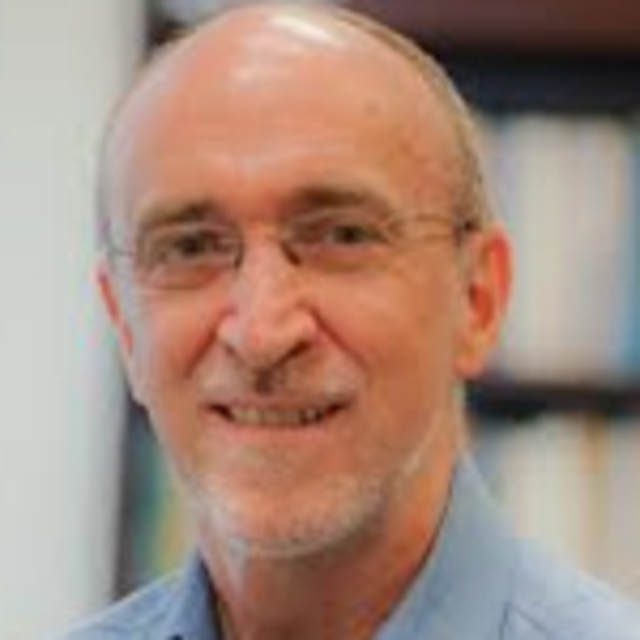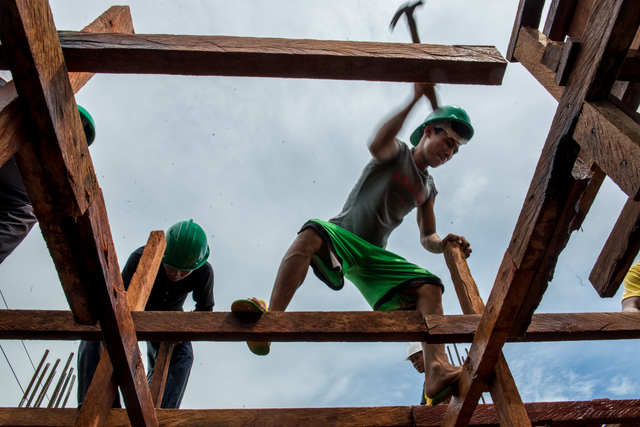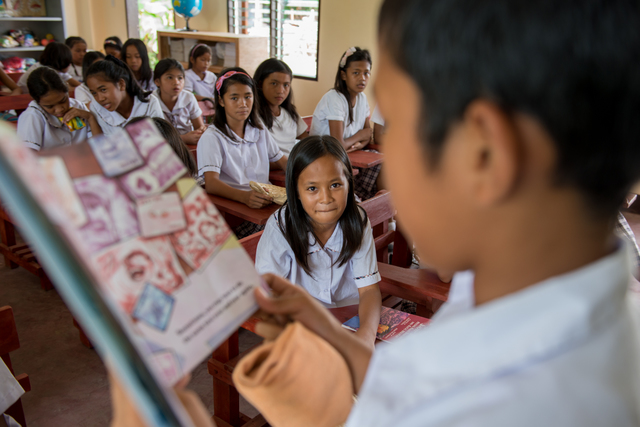Showing posts with label Community. Show all posts
Showing posts with label Community. Show all posts
Friday, July 28, 2017
Wednesday, February 3, 2016
Breaking Ground: Guiuan RHU

03FEB2015. "A one-of-a-kind Rural Health Unit [RHU], something different, something better", said newly appointed DSWD8 Regional Director Resty Macuto earlier today, at the ceremonial ground breaking on the rehabilitation/repair of RHU1 in Guiuan, Eastern Samar.

Together with RD Macuto, Ms. Su Chin Teoh, Asian Development Bank (ADB) Philippines Country Specialist was present to grace the occasion. She revealed to everyone that this RHU, costing more than P17million, has so far been the biggest budgeted Yolanda-related sub-project implemented by DSWD Kalahi in region 8 with funding from the Japan Fund For Powevert Reduction.
In her message, Ms. Teoh, on behalf of ADB and the Government of Japan, congratulated everyone present, for cooperating to come up with one singular project for the benefit not only of the whole town but even of nearby communities - "we can do several small projects per Barangay, but together we can build a big project that is really really useful to all". She thanked everyone for working together as "without working so hard, there wouldn't be such a beautiful sub-project". She further told everyone she'd be back April 30, 2016 (expected sub-project completion date), to see if the structure and its facilities are up and running!

The modernistic facility, as described by Architect Vanessa R. Ayllon will have a vast lobby to fit the many patients expected daily. It will also have a pharmacy that will be open 24/7. A unique child-friendly immunization area is also featured, that will have educational/play facilities with separate entrance and exit, so that kids won't get traumatized hearing other children wail after the vaccinations! A modernistic dental clinic, a midwives' station and even a conference room will be part of the many facilities.

The Mayor on his part, did not only thank the Donor (ADB JFPR in behalf of the Government of Japan) and DSWD, but he also echoed Architect Ayllon and RD Macuto's descriptions, that this facility will benefit the residents of island-barangays and far-flung mountain communities as there is provision for a "halfway house" at the second floor that will serve as a dormitory if and when they cannot yet go to their homes for various reasons such as incliment weather. All these he said, came to fruition because of Guiuan's unity.

The program:


photo credits: Lala Ruiz, Marlowe Popes, Jonathan Esperas
Tuesday, January 26, 2016
Micro-Business By Helping Mother Earth!
Yes, there is such a thing!




SMUPA means “San Miguel Unity to Progress Association”. They are a group of farmers in Barangay San Miguel, Balangiga Eastern Samar - now a fledgling business startup with very high potential of making it to successes beyond their imaginations, if accorded more expert guidance, and hopefully more help from all of us, we happy earthlings!
 | |||
SMUPA officers & members pose for a souvenir photo with visitors Dindo Mengote-ADB JFPR Consultant, Aya Yamagata - Plan International Japan and Justine Turner - Plan International Canada |
How did this happen?
They started as a Cash For Work (CFW) group in August 2015, organized by Plan International (Plan) with funding from ADB JFPR Grant 9175. This program was activated, instead of Plan-ADB/JFPR just automatically giving dole-out amounts to people devastated by super typhoon Yolanda. They were asked to work on something that would benefit their community, for a "reward" amount of P260/day - equivalent to the minimum wage in the region. But only for one month. So, each member expected to receive just little over P7,000 if the work was actually to last a month.
 |
| They still use the banner that identified them as a Cash-For-Work group in August 2015! |
What did they do as CFW volunteers? Other groups did other things, but this group (with guidance from the local authorities and Plan Int'l, opted to re-plant mangroves so that the area in their barangay wiped out by Yolanda could become a mangrove forest once more. They were taught how to extract seedlings from mangrove trees that remained. They were also taught how to care-for (wean) these little trees in a makeshift nursery, until ready for planting. And of course, they had to learn the technical details in re-planting mangroves. All that, and the work was a success enough - they received remuneration that they considered help enough for their daily needs. But until when will a P7,000++ last for each family?
Twist of fate!
Four months after their CFW experience, mother earth must have smiled a bit, as the mangrove trees they planted have generally grown well! Hurray for us earthlings... and to them who planted!
But a better twist came in November 2015. A challenge... an opportunity...

Maslog (south-most barangay of Lawaan, Eastern Samar) an adjacent barangay to San Miguel (being the northern-most barangay of Balangiga) had a mangrove planting project too - funded by another INGO. They learned about the little nursery that the San Miguel group had done in the past and offered to buy seedlings so they can also re-grow their portion of the contiguous mangrove forest on this area of Eastern Samar. Not at first thinking about the earnings, but still on the "help mother earth mood" our CFW folks in San Miguel re-grouped to reproduce at least 2 species of the mangrove trees!
A registered business entity!
While growing the seedlings, this CFW group thought of formally organizing themselves, as they expected money would come in, and they better have rules to properly manage an upcoming earning potential.

10 November 2015, 41 members gathered and contributed membership/registration fees of P50 per person. They agreed to also pitch-in a monthly (due) of ten pesos (P10) each moving forward, for which 22 members already paid in advance. Thus, the group had a starting capital of P2,220 that they thought would probably be enough to get them through some materials (seedling bags) and clerical/administrative expenses! Yes, Mana Cynthia, they now know they need money to earn more money! Oh, it was at this "incorporation meeting" that they decided to call themselves SMUPA - San Miguel Unity to Progress Association!
Open for Business and more!
And.., the first sale of 1,500 seedlings (at P10 each) happened on 23 November, followed by their second delivery to the same buyer (Barangay Maslog) of an additional 5,000 seedlings two days after Christmas!
Eyes grew wide.., all of a sudden, their "love mother earth" activity had just earned them P65,000 pesos! Whoa! "What to do?"!
Heavenly Gods were probably smiling at SMUPA as they entered the New Year 2016 with an admirable amount of ‘cash on hand’ just for growing mangrove seedlings!
Simultaneously, in and around Christmas time, more blessings were hovering upon SMUPA: still under the ADB JFPR Grant 9175, Plan International was at about the time, organizing/qualifying groups to become beneficiaries, who could receive ‘seed capital’ of up to P100,000 if they pass the rigorous screening in what is called the "Community Based Enterprise Development" (CBED) Program. SMUPA members, being ex-CFW volunteers are familiar with, and are friends with Plan International's CDF (community development facilitator) Diana Baradan who told them about the opportunities in/by learning about CBED.
 |
| CBED groups underwent Financial Literacy Workshops. This "financial statement" is one of their learnings! |
SMUPA went all out to join and learn in the CBED training, presented and defended their business proposal (business plan), and came out successful to pass the screening to become a recipient of a P45,000 seed capital (as proposed by the group)! This seed capital is coming their way anytime soon!
Challenges
Not everything is a joyride for SMUPA though. There are little kinks they have to attend to, especially on the 'management side'. Thus the Plan-ADB/JFPR group is still handholding them along the way to tackle these challenges.
Challenges like what?
Membership attrition. From a start of 41 members, there are now just 25. Most of the attritees are male members (only 6 remain active). Main reason for leaving the group? As heads of their respective families, they still have to individually look for daily subsistence, since SMUPA by-laws declare that they can only split their earnings (as dividends) at the end of any year; and three consecutive absences mean they'll have to be expelled from the association. Hmm and however, on the other hand, due to their need for more hands, SMUPA has actually already employed 10 non-member folks to help in the bagging and preparation of seedlings at one peso a piece. So a question is now on their ‘congress floor’ – can’t we as SMUPA members be the employees too to work and receive one peso per seedling prepared? Let the board decide! They soon will!

Transportation to/from this nursery is an issue too. This lot area lent to the association is way far (about 2 kilometers) from their residences. Though the nursery is just along the national highway, it costs them P20 one-way via habal-habal, and not all can afford that - even if they come to work only on Tuesdays, Thursdays and Saturdays. Not to mention lunch while at this nursery. And some mothers already bring their little tots with them to this nursery.
Cuts and bruises. Getting the mangrove seedlings from the source (marshes) requires some skill that even the so-called expert members still usually incur cuts and bruises in the process. They probably need to be tooled more, not only with proper gears, but also with technical procedures and utmost care for their personal safety.
All these are (of course) being looked into by the Plan staff who are constantly on the watch to ensure SMUPA's success.
Ca WE help?
If you... yes you reading this... if you have reached up to this part reading this article... you are needed to pitch-in a little help.
How? Tell the whole country and the whole world via FB, Twitter, Txt, email or calls, that we all need to re-grow our mangroves, and if anyone need the seedlings, SMUPA is just a call or txt away. Help us spread the word to sustain SMUPA's market. Maricel Badilla, the Secretary of SMUPA can be reached via +63 916 337 5599.

Market?
Yes there is, but for how long? They have an upcoming order of about 65,000 seedlings from their LGU itself and probably another 5,000 seedlings from a youth organization planning to do their own share to care for our mangroves. Fantastically brisk business! But, only having more orders at regular intervals will sustain this endeavor, so that the merrier SMUPA will be, and of course, the happier this planet will be!
So, while encouraging everyone to re-green our planet, let’s also tell this whole world there is SMUPA that can provide us with mangrove seedlings!
In the first place… we're all in this together, right?!
Saturday, November 28, 2015
A New Building for Salvacion Elementary School
28NOV2015. A beautiful day to remember for the pupils, teachers and parents of Salvacion Elementary School in Dulag Leyte, even for the DepEd Regional Director of Region 8.

A new building, consisting of 4 classrooms was handed over today by the ADB JFPR Grant 9175 and their implementing partner Plan International. This was in response to the sorry state of all buildings in the school after typhoon Yolanda/Haiyan - the very school where a young new teacher Ma. Luisa Bautista (now RD Ma. Luisa Bautista Yu), started her teaching career!

The ceremony started with a holy mass and blessing of the rooms where the priest in his homily said "this is a very good new year's gift as tomorrow is the first day of the liturgical year (advent)". A parent whispered, that the light shower that occurred as the building was being blessed, was a real blessing from heaven!

The DepEd Regional Director for Region VIII, who was earlier too eager and excited for this hand over ceremony, was unfortunately unable to attend due to urgent official exigencies elsewhere in the country. But she was as excitedly and ably represented by her officials, R8 Planning Officer Rita Dimakiling who delivered RD Yu's message; while Leyte Division School Supt Ronelo Firmo and Dulag South Principal-In-Charge Lea Robin took turns at thanking the donors and encouraging parents and children to make good use of the new building by sending all children to school, and taking care of the rooms when used as evacuation center.


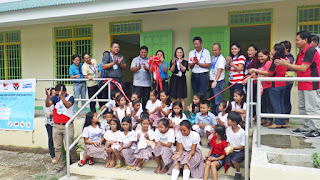
Salvacion ES kids performed their unique way of saying "Salamat" to the donors!

Interestingly, this ceremony was so actively participated in by the school's PTA and Alumni Association who were already all over the place early in the morning, helping the teachers, kids and Plan International's CDF Jayson Laurente prepare for the joyous event. Both organizations even voluntarily prepared food for everyone who attended the ceremony!
More photos of the event at our
Tuesday, November 24, 2015
Farm Materials Distributed At Salvacion, Dulag
Truckloads of rice seeds, sprayer tanks, vermicast and sweet potato cuttings descended upon the barangay this morning (24NOV2015) to the delight of the eagerly awaiting beneficiaries. It's farming materials and implements this time for Barangay Salvacion in Dulag, Leyte!

All these courtesy of ADB JFPR's Grant 9175 being implemented by Plan International to alleviate the economic condition of the community.
42 farming families qualified as recipients and received varying amounts of the said farming inputs, depending on the type of, and the size of their farming areas. Many are into rice farming, thus the truckload consisted a majority of sacks of 'mega yield foliar' (certified rice seeds). Some are into sweet potato (camote) farming, but there's even a water melon farm in a hectare or so of land. Dulag's Municipal Agriculture Officer was on hand to validate recipients and distribute the inputs.

These farming inputs did not however just materialize as a bright idea of the funder (ADB's Japan Fund for Poverty Reduction) nor the implementing partner (Plan International). This came out as one of the many agreed interventions needed after a series of community meetings and FGDs (Focus Group Discussions).
One of the recipients, Mr. Ernesto Garcia Jr., (referring to what he received) intimated that this was all he needed to restart his farm anew. He further assured us with an invitation to come see his farm after a month saying "sigurado, diri ako niyo ikaka-awod" (I'm sure you won't be ashamed of my outputs)!
If these farm inputs we distributed are "just one of the many", what other interventions has ADB JFPR (via Plan Int'l) done in this barangay? Well, some have qualified to be recipients of the Community Based Enterprise Development (CBED) Program, where groups are trained in entrepreneurship, after which they submit and defend their business proposal for viability, and if they pass, they receive the start-up capital needed as stipulated in their business plans.
Other community members have participated in the Cash For Work Program that ended last month (those who did vegetable farms are already harvesting). The PWDs and elderly received their share that came by way of UCT (unconditional cash transfers). Adults have been trained on DRR while children also had their version of said awareness and readiness campaign.
Out of school boys and girls were plucked out of the barangay for some time, where they enrolled and lived as full scholars at KEITECH or BCAT to earn their TESDA certificates in various courses of their choice! And, 4 days from now, that would be the 28th of November, we are handing over a spanking new 4-classroom building to Salvacion Elementary School!
Happy to help.

All these courtesy of ADB JFPR's Grant 9175 being implemented by Plan International to alleviate the economic condition of the community.
42 farming families qualified as recipients and received varying amounts of the said farming inputs, depending on the type of, and the size of their farming areas. Many are into rice farming, thus the truckload consisted a majority of sacks of 'mega yield foliar' (certified rice seeds). Some are into sweet potato (camote) farming, but there's even a water melon farm in a hectare or so of land. Dulag's Municipal Agriculture Officer was on hand to validate recipients and distribute the inputs.

These farming inputs did not however just materialize as a bright idea of the funder (ADB's Japan Fund for Poverty Reduction) nor the implementing partner (Plan International). This came out as one of the many agreed interventions needed after a series of community meetings and FGDs (Focus Group Discussions).
One of the recipients, Mr. Ernesto Garcia Jr., (referring to what he received) intimated that this was all he needed to restart his farm anew. He further assured us with an invitation to come see his farm after a month saying "sigurado, diri ako niyo ikaka-awod" (I'm sure you won't be ashamed of my outputs)!
If these farm inputs we distributed are "just one of the many", what other interventions has ADB JFPR (via Plan Int'l) done in this barangay? Well, some have qualified to be recipients of the Community Based Enterprise Development (CBED) Program, where groups are trained in entrepreneurship, after which they submit and defend their business proposal for viability, and if they pass, they receive the start-up capital needed as stipulated in their business plans.
Other community members have participated in the Cash For Work Program that ended last month (those who did vegetable farms are already harvesting). The PWDs and elderly received their share that came by way of UCT (unconditional cash transfers). Adults have been trained on DRR while children also had their version of said awareness and readiness campaign.
Out of school boys and girls were plucked out of the barangay for some time, where they enrolled and lived as full scholars at KEITECH or BCAT to earn their TESDA certificates in various courses of their choice! And, 4 days from now, that would be the 28th of November, we are handing over a spanking new 4-classroom building to Salvacion Elementary School!
Happy to help.
More photos of the event at our
Saturday, November 7, 2015
Rappler: 2 years after Yolanda: Learning from disaster
Here's news from Rappler.com: and we Quote
Two years after Typhoon Yolanda (international name: Haiyan) made landfall in the Philippines, recovery and reconstruction are well underway. We have learned many lessons – and are still learning – from the Yolanda response, and from how other countries have handled post-disaster recovery.
Unquote
A robust system to monitor progress is needed to enable effective communication about recovery. Without it, conflicting messages and directions can lead to confusion rather than clarity.
Richard Bolt
Published 3:00 PM, November 07, 2015
Updated 3:00 PM, November 07, 2015
Two years after Typhoon Yolanda (international name: Haiyan) made landfall in the Philippines, recovery and reconstruction are well underway. We have learned many lessons – and are still learning – from the Yolanda response, and from how other countries have handled post-disaster recovery.
These valuable insights can help decision-makers tasked with implementing recovery to address emerging issues and strengthen resilience to future disasters – especially at a time of rising disaster risk and increasingly frequent extreme weather events. Through monitoring, evaluation, and knowledge sharing, these policies and practices can be altered as necessary to fit changing circumstances.
A key to coping with the aftermath of a disaster the scale of Yolanda is to draw on the knowledge and experience from within the Philippines and from other countries – in this region and beyond – which have had to respond to disasters.
This was an overriding message from the recent Regional Knowledge Forum on Post-Disaster Recovery hosted by the Asian Development Bank. Despite differences in institutions, budgetary resources, and the nature of disasters faced, there are common elements to each and every recovery process.
These comparisons help to put our own post-Yolanda experience in perspective. In Indonesia, following the Indian Ocean earthquake and tsunami, efficient relief operations helped to elevate expectations – ironically creating the potential for dissatisfaction when transitioning to the recovery phase.
Heru Presetyo of Indonesia’s BRR Institute, the agency tasked with rehabilitation and reconstruction, told the post-disaster recovery forum that: "Year two [after the event] is the most difficult. This is the year when expectations are high and recovery is slow."
Clearly, managing expectations is crucial. This can be done through effective communications, which should be consistent, comprehensive, and coordinated. A robust system to monitor progress is needed to enable effective communication about recovery. Without it, conflicting messages and directions can lead to confusion rather than clarity.
The second takeaway from post-disaster recoveries is that inadequate local capacity is common to almost all of them. Large-scale disasters can easily overwhelm local authorities. From damage assessment and recovery planning to implementation and monitoring, local government units may lack the technical and financial capacity to even make a successful start to the recovery process.
Technical assistance
Even large jurisdictions with plentiful resources often find it challenging to cope with the devastation wrought by a large-scale disaster. At our post-disaster recovery forum, the experience was compared by Scott Davis, who was involved in the rebuilding from Hurricane Sandy in 2012, to drinking from a fire hose when you’re at your weakest and with a thousand rules for how to do it.
Delivering well-targeted abundant technical assistance that addresses capacity needs will help matters, particularly if it creates a cadre of local experts capable of rebuilding lives, buildings and institutions with no effort spared.
Empowering local authorities is crucial, as reconstruction can’t be piecemeal. Schools, hospitals, and livelihoods must be re-established to new standards of resilience. Jobless survivors need to be taught new skills – like how to turn an idea into a small business. Indeed, businesses need extra support on issues like accessing finance to re-establish markets and supply chains when disaster strikes.
REBUILDING. Carpenters build new classrooms at the Bislig Elementary School in Tanauan, Leyte. Photo by Ariel Javellana/ADB
A third lesson is that business as usual isn’t enough when results are needed quickly on the ground after a disaster. Instead, efficient implementation should prioritize simple project designs and procurement processes, streamlined disbursements of financial assistance, and capable partners to implement project activities. Making this happen demands strong leadership, effective coordination, and the flexibility to adapt to changing priorities and needs during implementation.
Pre-existing policy problems are exposed and amplified by disaster. But this can be an opportunity to address these issues and build back better in terms of policy. Some particularly challenging policies in a recovery setting are demarcation of no-build zones in hazard prone areas and involuntary settlements, and low-cost financing for housing and livelihoods to help households and small businesses recover.
Accumulating and sharing knowledge gained during recovery on these and other issues will inform better policies that can become building blocks of future resilience.
IN SCHOOL. Students attend class inside the new classrooms at the Bislig Elementary School in Tanauan, Leyte. Photo by Ariel Javellana/ADB
Finally, the most important lesson of all is to deliver support quickly, and in a way that strengthens – not weakens – government institutions. The importance of coordinating closely with the government cannot be overstated. Development partners like ADB should take their cues from the government, aligning their financing assistance with its assessments and recovery plans.
Yolanda – like all large-scale disasters – was a tragedy, but it was also a learning opportunity to do better moving ahead. By heeding lessons now, we can save lives and improve living standards and livelihoods in the future.
Richard Bolt is the director of ADB’s Philippines Country Office
Richard Bolt is the director of ADB’s Philippines Country Office
Unquote
Friday, September 25, 2015
Yolanda Victims Trained As Agricultural Extension Workers
25SEP2015. "Transforming Farmscape through Diversified and Integrated Farming". That's the formal title of a training workshop attended by 30 beneficiaries from Leyte and Western Samar selected by Plan International under the ADB JFPR Grant 9175 who will become what we call Agricultural Extension Workers at their respective communities.

This intensive 5-day live-in seminar ended today at the Department of Agriculture's Agricultural Training Institute (ATI) inside the Visayas State University in Baybay, Leyte, where participants received their certificates after doing a rigorous action planning together with their respective LGU's Agricultural Technologists and Community Development Facilitators (CDFs) from Plan Inernational.
Next step, these 'graduates' will become trainers of their fellow residents on more productive farming techniques and approaches that includes awareness of calamity resilient areas, products or activities.

This intensive 5-day live-in seminar ended today at the Department of Agriculture's Agricultural Training Institute (ATI) inside the Visayas State University in Baybay, Leyte, where participants received their certificates after doing a rigorous action planning together with their respective LGU's Agricultural Technologists and Community Development Facilitators (CDFs) from Plan Inernational.
Next step, these 'graduates' will become trainers of their fellow residents on more productive farming techniques and approaches that includes awareness of calamity resilient areas, products or activities.
Thursday, August 13, 2015
'Cash For Work' Payout: Burauen
They have done Demo Farms, Children's Playgrounds, Communal Gardens, Compost Pits, Earth Canals, Road Patching, Pathways, Fencing of Schools, Nursery Houses, Landscaping, Warehouses, Water Pipelines, and other such things all over several barangays in the Yolanda stricken areas of Samar and Leyte. That, is the CFW or 'Cash For Work Program'.
Today we chanced upon a payout time in Burauen, Leyte! Cash-For-Work activities in the area is over and done, so, volunteers have to 'claim' their remuneration!

This is/was executed by by Plan International funded under the ADB JFPR Grant 9175.
Not a simple activity though. Beneficiaries trooped to the Palawan Pawnshop branch in Burauen to personally receive payment. It being a small branch, and the beneficiaries, all hundreds of them coming altogether, needed some kind of "crowd management" of sorts. But the Plan Int'l CDFs (Community Development Facilitators) were on hand to put everything in order.
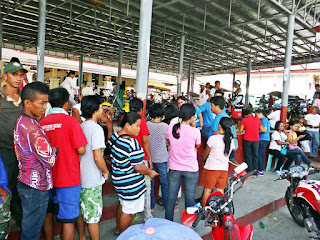



And it was actually fun where everyone was teasing everyone - a time to banter with neighbors and friends while queuing up!
Some were early, some were late - but they had the same reason - having had to still go somewhere else and also que up to receive their ESA (Emergency Shelter Assistance) that were also distributed today in Burauen. Hmm, didn't today rain with money in Burauen?!




Daring to banter with this writer, some of these beneficiaries revealed interesting facets about their CFW experience.
Like? Like it was fun working with their neighbors, on something that they in the community themselves would benefit from! One said, they actually know this was dole-out to alleviate their condition brought about by Yolanda, but they felt braver and shameless to receive the amount, as they know they have worked for it, one way or the other.
One response from a beneficiary was particularly strikingly encouraging when he said "di bale sir, kay sunod mahitabo ini ha iba nga lugar, bangin kami naman makabulig ha ira, bisan nala pag-tutdo aanhon an pag-burublig pag-gios ha pag-bangon tikang ha kakurian" (sir, next time this [calamity] happens in other places, we might be able to help them [victims], even if just to teach how everyone should cooperate towards rising from their hardship).


Two 'credit ladies' (loansharks?) were seen milling around with the beneficiaries armed with notebooks and pens! Prompt and punctual ladies hehe - they were there to immediately claim payments from beneficiaries who borrowed money from them. But they are good friends with virtually everyone around, and joined in the banter. Asked what these beneficiaries borrowed money from them for, one of the 2 ladies shared that the 'very usual' reason was: farmers borrowed money from her to buy livestock to grow. Useful naman pala!










What a heartwarming day!


